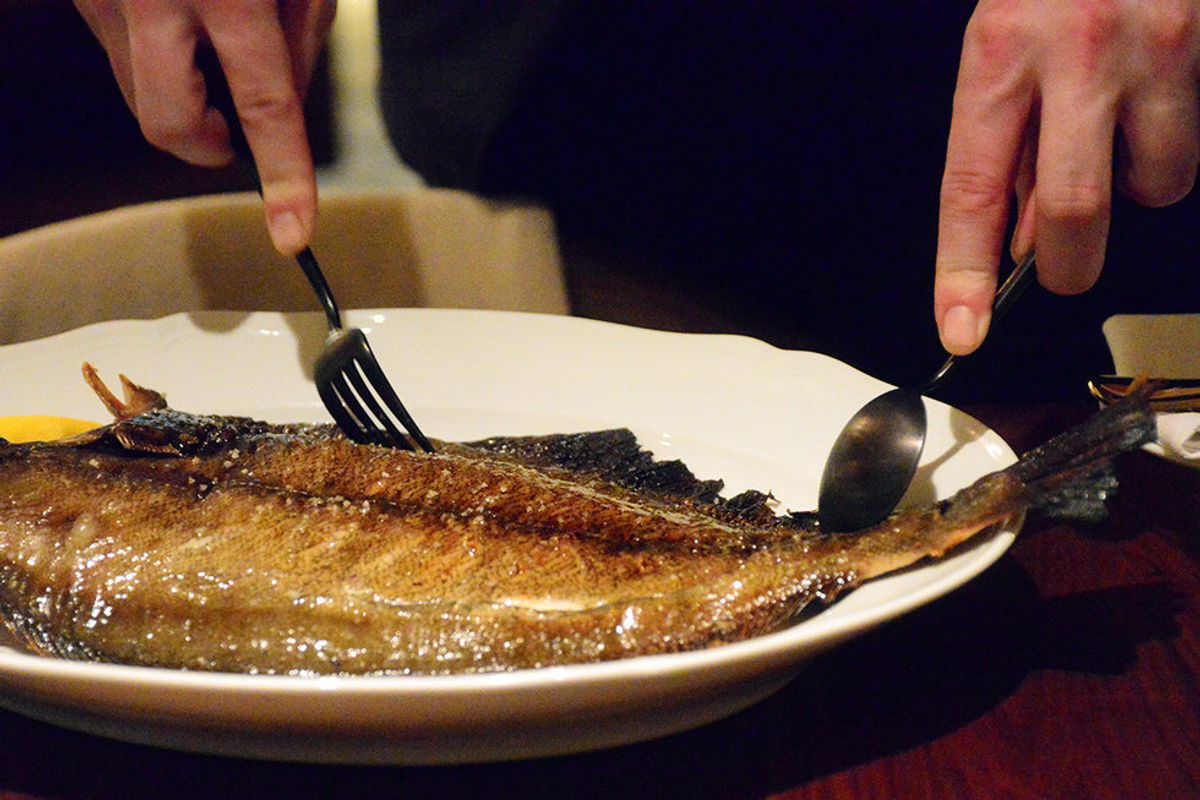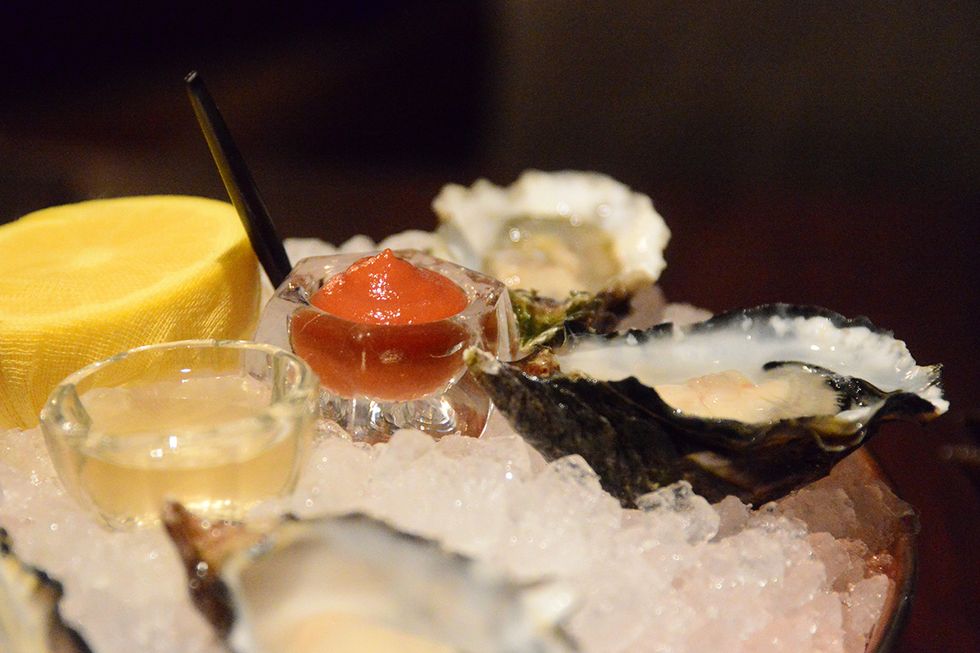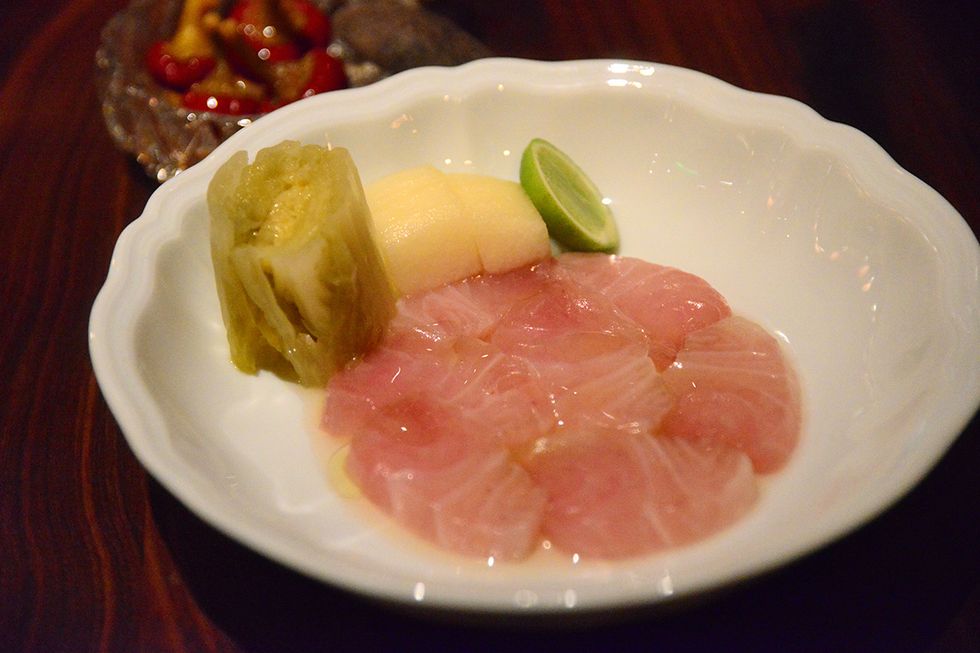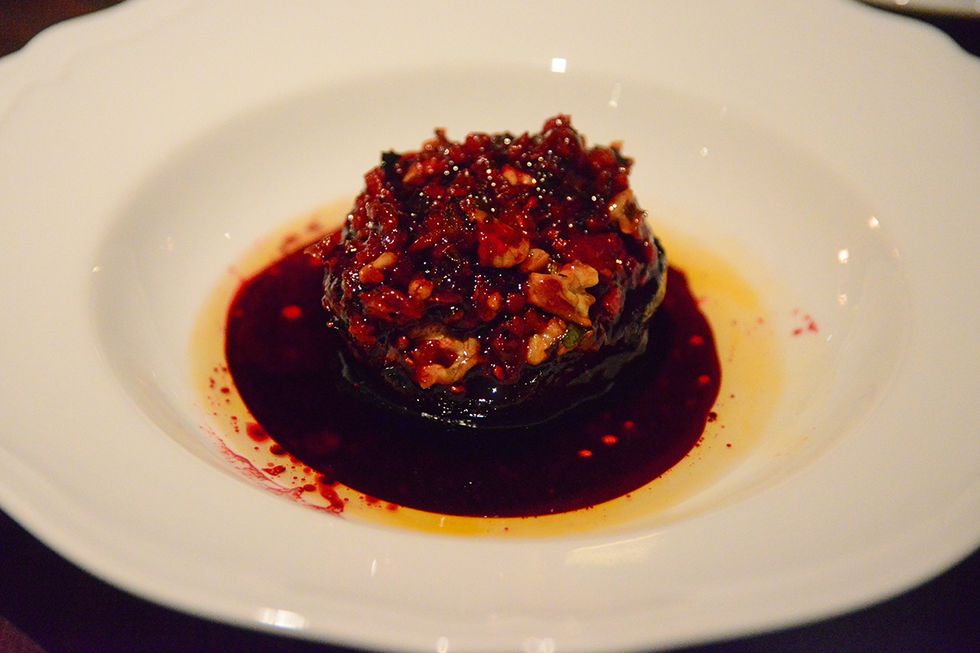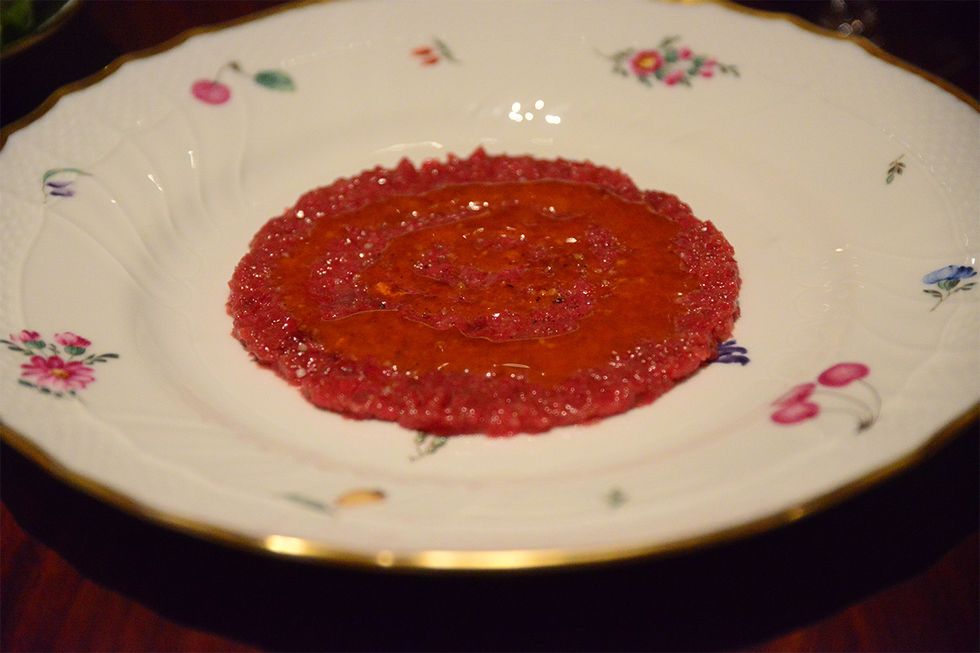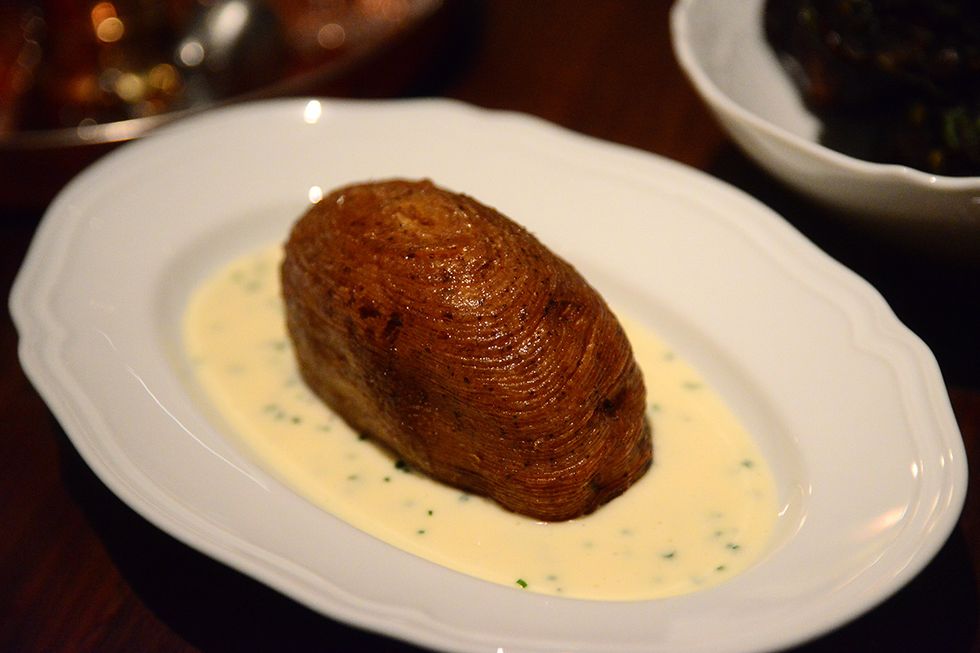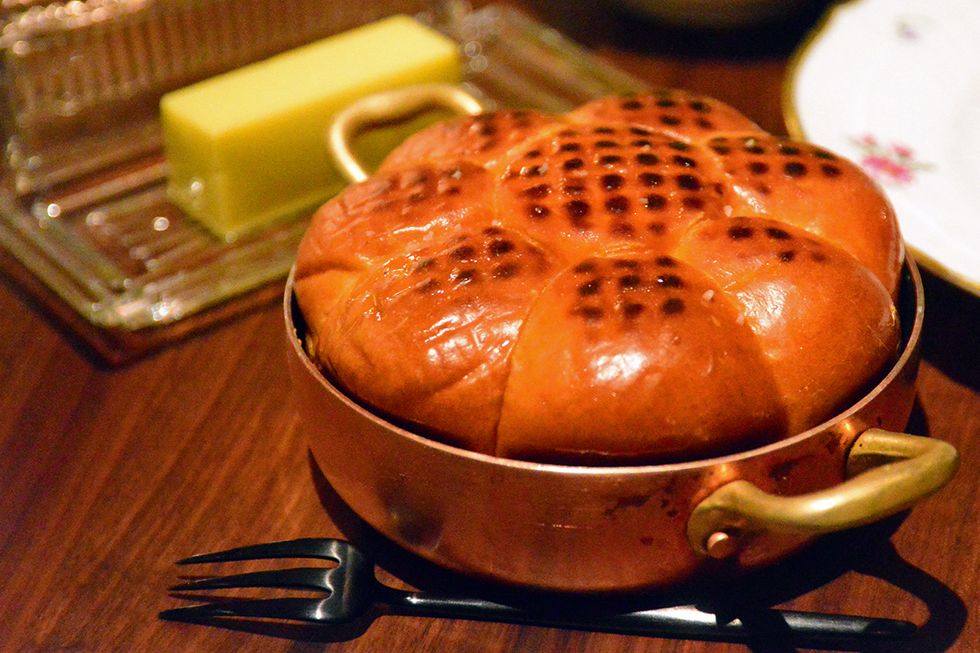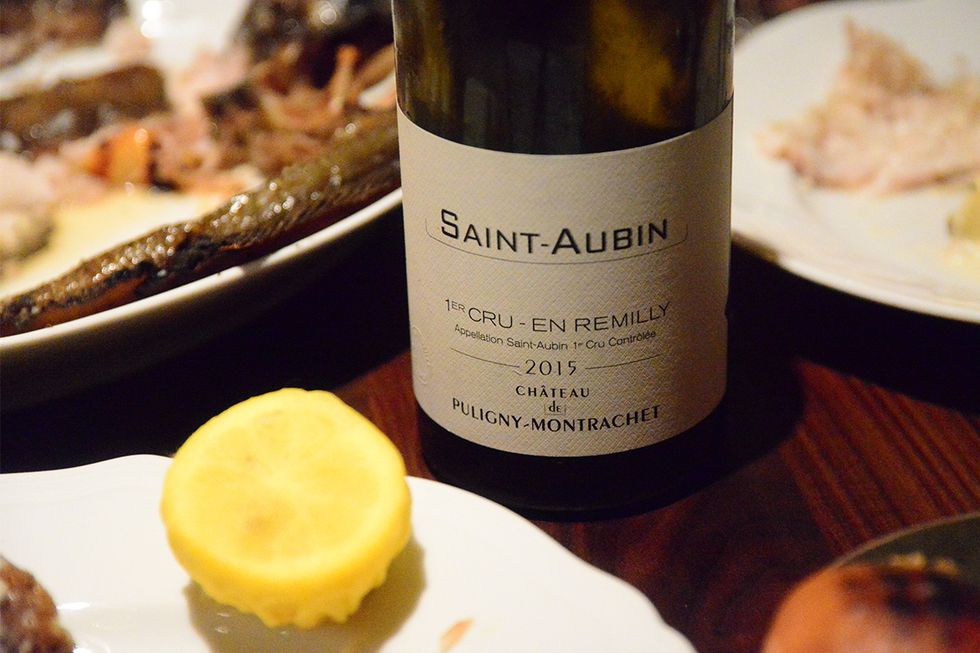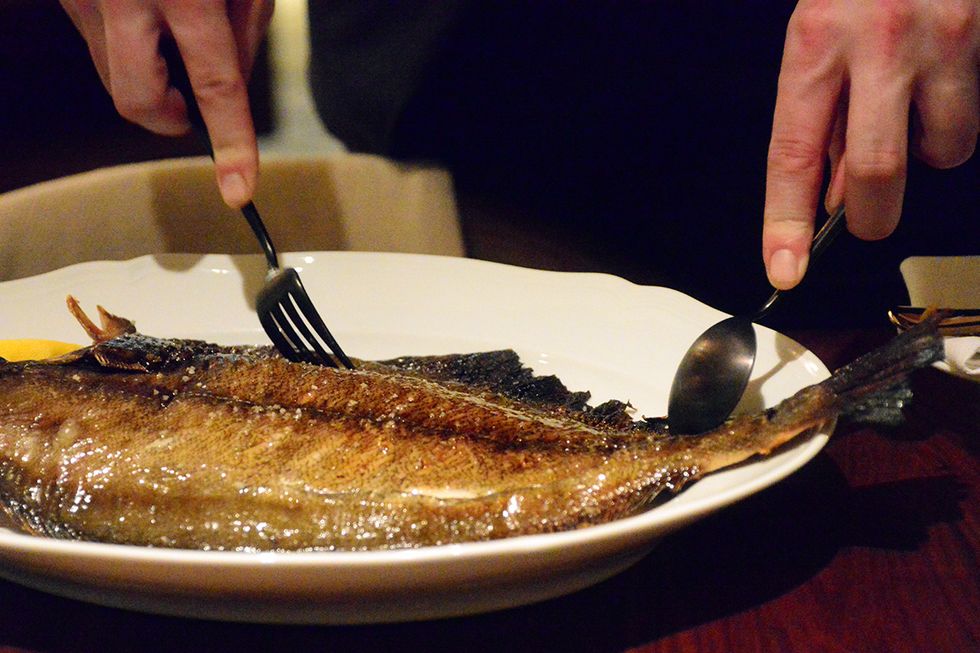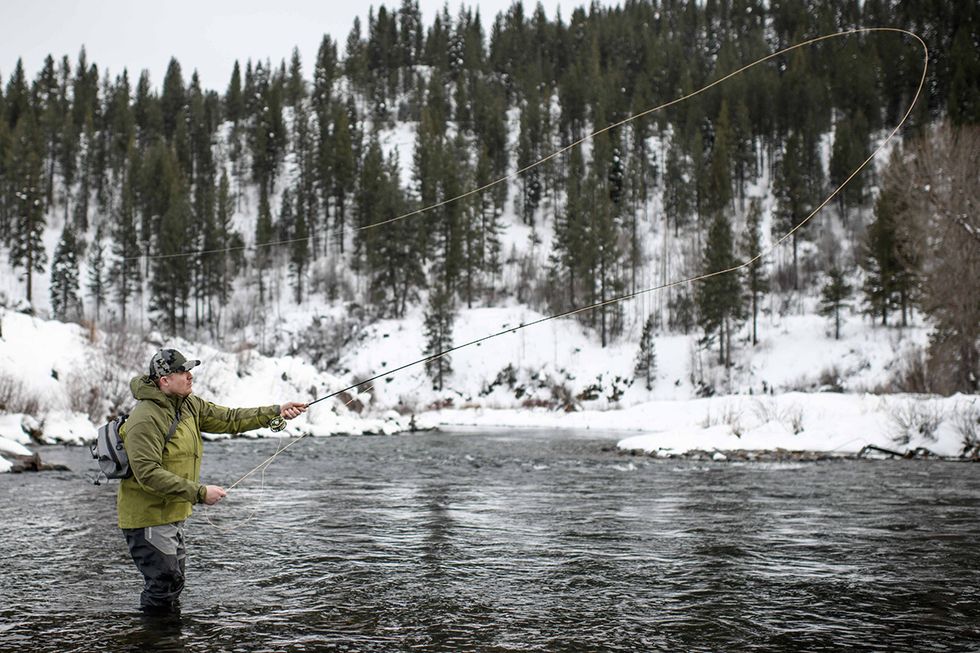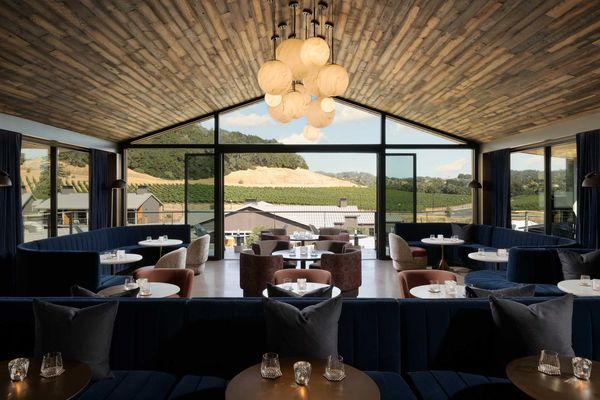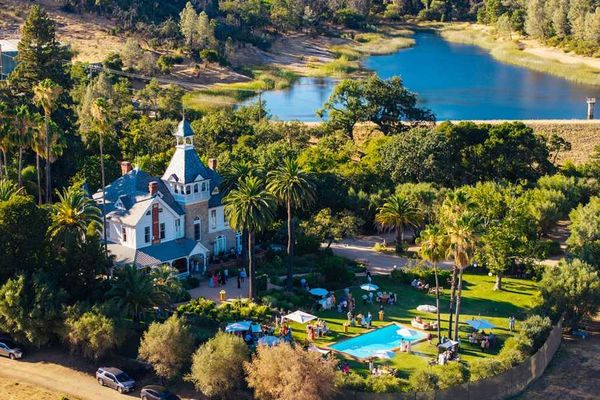It was a chilly January night and the almost-empty 31 whirred down Market Street towards the Embarcadero. It's just a quick bite to eat, I told myself. A snack, really. An appetizer, a glass of wine, and then home.
Besides, it wasn't my first visit to Angler. I'd eaten there a few weeks earlier, and knew the territory. No need to go overboard.
I took a seat at the bar, between a fellow from Chengdu and another from Texas, both drawn to a place whose early notoriety was no doubt inspiring shudders of envy among restaurateurs from California to the coast of Maine. The buzz, which began long before the opening in late September 2018, was not unwarranted. Angler's founder, the chef Joshua Skenes, co-founded Saison, the 10-year-old San Francisco restaurant whose wood-fire cooking has earned three Michelin stars every year since 2014. Reflecting on a dinner I had at Saison two years ago, I struggled to recall an experience that's come close in terms of the purity, subtlety, and depth of flavor. Last July, Skenes announced that his friend, the French chef Laurent Gras, would be "joining the team at Saison." Gras, it turns out, would in fact be running Saison, leaving Skenes free to work on Angler and other projects.
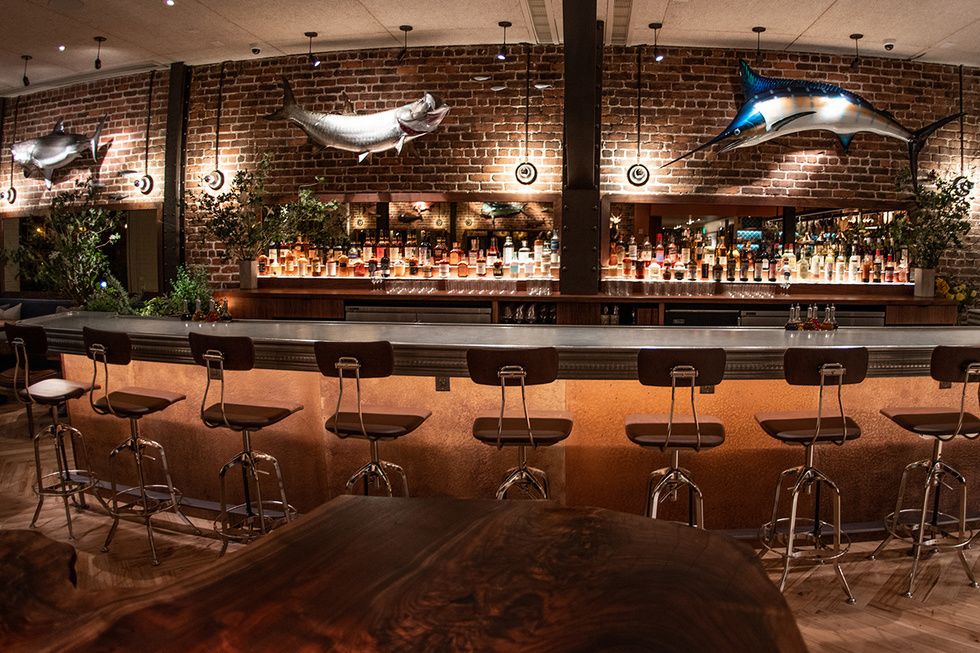
A "sea life-focused restaurant," Angler employs an array of wood-fired grills and other contraptions of the sort that Skenes designed for Saison. Since Saison served a fair amount of fish, crustaceans and mollusks under Skenes' tenure, I was curious about the distinction between the two restaurants. "It all came to be from the same ethos," Skenes explained, "which is just how I like to cook and eat food."
"The only difference," he continued, "is in the amount of time it takes and the cost of the products. Saison typically took more labor for each item and costs much more. I just wanted a restaurant where I could go and get great products simply prepared and have a great time doing so, without any BS. That is Angler."
At Angler's bar, which serves the full menu, my neighbors were putting away serious quantities of food. To sharpen my focus, I ordered a glass of rosé—a pale pink and ethereally tart l'Ile de Beauté from the Corsican winery Domaine Casa Rossa—and admired the artistry of the taxidermist responsible for the remarkably lifelike marlin leaping defiantly above an assortment of top-flight liquors. Nearby, a museum diorama-quality shark glared across the dining room at the mounted heads of a trio of ungulates. The upscale hunting lodge aesthetic is all Skenes, an avid hunter and fisherman who extolls the virtues of wild fish and game.
Oysters are another matter, and while I've tangled with wild oysters from Scotland and Norway, if I'm eating multiples, I prefer the more delicate flavors of their cultivated cousins, especially those from Tomales Bay. Marin Miyagis were on the menu that evening. I ordered a quartet, served on ice with a tiny bowl of mignonette, and another of a smoky-sweet cocktail sauce made from tomatoes cooked over a bed of glowing embers whose temperature is regulated by hand-held fans—one of the 40 or so techniques in Skenes' wood fire repertoire. Why I had just four rather than the standard half-dozen, I'm not sure, but it left a craving I imagined would be perfectly satisfied by the amberjack crudo I so fondly remembered from the previous visit.
[rebelmouse-image 19262737 is_animated_gif=false crop_info="%7B%22image%22%3A%20%22https%3A//assets.rbl.ms/19262737/origin.jpg%22%2C%20%22thumbnails%22%3A%20%7B%22origin%22%3A%20%22https%3A//assets.rbl.ms/19262737/origin.jpg%22%2C%20%2235x35%22%3A%20%22https%3A//assets.rbl.ms/19262737/35x35.jpg%22%2C%20%22980x%22%3A%20%22https%3A//assets.rbl.ms/19262737/980x.jpg%22%2C%20%22700x1245%22%3A%20%22https%3A//assets.rbl.ms/19262737/700x1245.jpg%22%2C%20%22600x200%22%3A%20%22https%3A//assets.rbl.ms/19262737/600x200.jpg%22%2C%20%221200x400%22%3A%20%22https%3A//assets.rbl.ms/19262737/1200x400.jpg%22%2C%20%22600x%22%3A%20%22https%3A//assets.rbl.ms/19262737/600x.jpg%22%2C%20%221245x700%22%3A%20%22https%3A//assets.rbl.ms/19262737/1245x700.jpg%22%2C%20%221200x800%22%3A%20%22https%3A//assets.rbl.ms/19262737/1200x800.jpg%22%2C%20%22600x300%22%3A%20%22https%3A//assets.rbl.ms/19262737/600x300.jpg%22%2C%20%22210x%22%3A%20%22https%3A//assets.rbl.ms/19262737/210x.jpg%22%2C%20%22300x300%22%3A%20%22https%3A//assets.rbl.ms/19262737/300x300.jpg%22%2C%20%22600x600%22%3A%20%22https%3A//assets.rbl.ms/19262737/600x600.jpg%22%2C%20%22600x400%22%3A%20%22https%3A//assets.rbl.ms/19262737/600x400.jpg%22%2C%20%22300x%22%3A%20%22https%3A//assets.rbl.ms/19262737/300x.jpg%22%2C%20%221200x600%22%3A%20%22https%3A//assets.rbl.ms/19262737/1200x600.jpg%22%7D%2C%20%22manual_image_crops%22%3A%20%7B%223x1%22%3A%20%7B%22width%22%3A%20980%2C%20%22top%22%3A%20163%2C%20%22height%22%3A%20327%2C%20%22left%22%3A%200%2C%20%22sizes%22%3A%20%5B%221200x400%22%2C%20%22600x200%22%5D%7D%2C%20%223x2%22%3A%20%7B%22width%22%3A%20980%2C%20%22top%22%3A%200%2C%20%22height%22%3A%20653%2C%20%22left%22%3A%200%2C%20%22sizes%22%3A%20%5B%221200x800%22%2C%20%22600x400%22%5D%7D%2C%20%221x1%22%3A%20%7B%22width%22%3A%20653%2C%20%22top%22%3A%200%2C%20%22height%22%3A%20653%2C%20%22left%22%3A%20163%2C%20%22sizes%22%3A%20%5B%22600x600%22%2C%20%22300x300%22%5D%7D%2C%20%2216x9%22%3A%20%7B%22width%22%3A%20980%2C%20%22top%22%3A%2050%2C%20%22height%22%3A%20552%2C%20%22left%22%3A%200%2C%20%22sizes%22%3A%20%5B%221245x700%22%5D%7D%2C%20%229x16%22%3A%20%7B%22width%22%3A%20368%2C%20%22top%22%3A%200%2C%20%22height%22%3A%20653%2C%20%22left%22%3A%20306%2C%20%22sizes%22%3A%20%5B%22700x1245%22%5D%7D%2C%20%22600x300%22%3A%20%7B%22width%22%3A%20980%2C%20%22top%22%3A%2081%2C%20%22height%22%3A%20490%2C%20%22left%22%3A%200%2C%20%22sizes%22%3A%20%5B%22600x300%22%5D%7D%2C%20%222x1%22%3A%20%7B%22width%22%3A%20980%2C%20%22top%22%3A%2081%2C%20%22height%22%3A%20490%2C%20%22left%22%3A%200%2C%20%22sizes%22%3A%20%5B%221200x600%22%2C%20%22600x300%22%5D%7D%7D%7D" pin_description="" dam=1 caption="Angler calls itself a "sea life-focused" restaurant." original_size="980x653" image-library="1" expand=1 photo_credit="(Bonjwing Lee)"] Angler calls itself a "sea life-focused" restaurant.(Bonjwing Lee)
The rosé was long gone, and waiting for the crudo, I sipped a deliciously dry zibibbo from the Sicilian island of Pantelleria while Angler's sound system, which specializes in '80s New Wave, pumped out INXS's "I Need You Tonight."
So slide over here
And give me a moment
Your moves are so raw
Amberjack is a lean fish, a result, perhaps, of a life spent racing through the deep on the hunt for crab and squid—its favorite delicacies. Its meat is dense, and has a muscular richness that was nicely complemented by the fine sweetness of Asian pear, the citric kick of Mexican lime, and the subtle tang of some cabbage that seemed to have been ever so gently fermented.
At Angler, the preparation of vegetables tends to be more elaborate than that of the fish and game. Take the case of the Embered Ruby Beet that a friend and I enjoyed on the earlier visit. Cooked above a fire for three days at a very low temperature, rested in its juices for 48 hours, then grilled to order, its flavor resembled an amalgam of beet and barbecue sauce, with a hint of flame-broiled beef; its texture firm yet silken. Or the Angler Potato: cut up into paper-thin sheets, reassembled into something resembling a tuberous topographical map, then grilled, basted with butter, and served surrounded by a shallow moat of sauce seasoned with the delicately flavored washed rind cheese, Taleggio.
An appetizer of pronghorn antelope, by contrast, was a study in minimalism, served à la tartare, dressed simply with egg yolk and citrus, and spiked with breadcrumbs crisped in the animal's fat. The flavor of the meat was intensely clean and pure and consequently somewhat difficult to describe, other than to say it tasted like health and vitality, and like an animal that had lived the kind of life that most of the animals we eat will never dream of.
To my mind, the carbohydrate is a vital nutrient, and the longer I stayed, and strayed from the original plan, the beguiling whispers of Angler's Parker House Rolls—their browned and burnished tops swelling above the edges of handsome copper pans—crescendoed to a siren song. Soon enough I was tearing into a phalanx of the things, but not before anointing them with loads of butter seasoned with seaweed, whose rich, umami flavor recalled a similarly tasty compound whipped up by the Saison alumnus Matthew Kammerer at the Harbor House Inn.
Energized by the bread, I glanced at the vegetables section of the menu, where a favorite mushroom—hen of the woods—was headlining. I hailed the bartender, and while I was at it, tacked on a spontaneously fermented nebbiolo from the Piedmontese winery Cascina Val del Prete. With 21 labels to choose from, Angler's by-the-glass list holds more than enough adventure for a night, or several. The bottle list, dominated by France but punctuated with intriguing selections from regions elsewhere in the Old and New World, runs north of 150 pages. The level of wine expertise among the staff is proportionally impressive. In addition to its wine director and director of wine programs, Angler employs the services of four sommeliers, one of whom proved to be as adept at filleting a petrale sole as he was versed in the finer points of Mosel riesling.
The hen of the woods was a brilliant piece of work: seasoned with a concoction called Angler Sauce—which seems closely related to the Saison Sauce Skenes once described as "an elixir of seaweeds, little local fish, and Aspergillus oryzae"—then cooked to a smoky succulence.
Pretenses of self-restraint long abandoned, I closed out the night properly, with a Louis Michel Premier Cru Chablis, and some more sea life. When I asked Skenes about his preference for that term rather than "seafood," he replied with a question, and answer, of his own. "All the life in the oceans is just for our consumption? Of course not. We have to be aware of our impacts in the world and try our best to help in our own small ways."
Like the crudi before it, the fish—striped bass from Southern California—was deliciously understated, seasoned with salt and pepper, fried to an outer crispness and an inner juiciness, and garnished with a little fried onion. Its simplicity spoke to a confidence on the part of Skenes, who takes issue with certain aspects of our food culture, and feels that "we shouldn't be looking for every course to be some magical proposition." It's a point worth considering, particularly since much of what passes for magic these days is chicanery, but when it comes to taste, true magic can take many forms, whether that of a humble root vegetable slowly transformed by the heat of a fire, the meat of an animal that lived as animals should, or an exquisitely fresh fish flavored by nothing more than salt, pepper, and the sea.
// Angler, 132 The Embarcadero, anglerrestaurants.com



